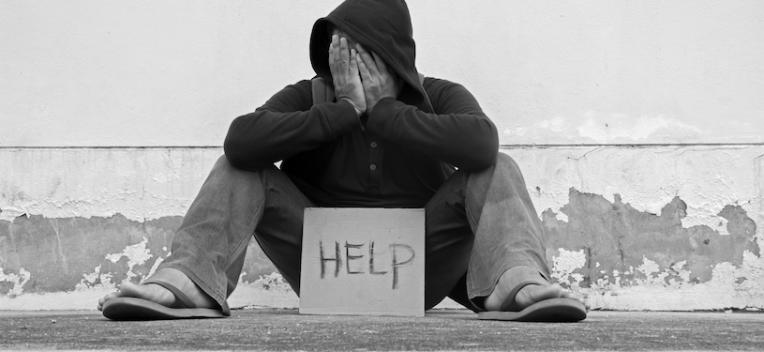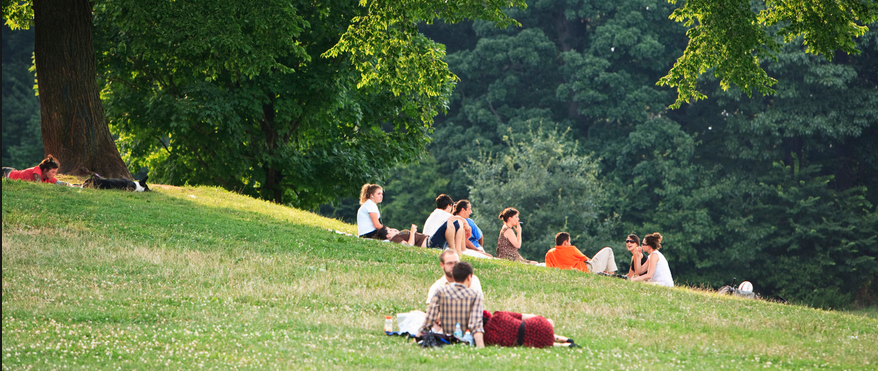A few nights ago, a very kind friend took me to a private screening of a film about homelessness, under the presumed theory that my own homeless experience from four years before might be of help to the filmmaker. This filmmaker, who I should point out was an extremely tall and quietly affable man (affable, at least, to anyone who he detected was very much like himself!), believed, like many myopic neoliberals, that he was doing the right thing with his film. But he wasn’t. He was, in fact, contributing dangerously and cruelly to a repulsive dehumanizing myth that has become as seductive as catnip to most of the American population.
The film played. The affluent crowd that gathered in the basement of this tony Manhattan restaurant cheered as some talking head boasted about delivering forty pairs of socks to the homeless. The socks, said this starry-eyed subject, were a way to give the homeless an identity. But I knew damn well that what these people really needed, as I once so desperately begged for, was food, a shelter that wasn’t committed to daily debasement and that actually did something to protect residents from random stabbings, and a stable job that permitted someone who had nothing to save enough resources for first and last month’s rent. This preposterous subject also bragged on film about taking homeless people to a comedy show to cheer them up. Never mind that this is a risible impossibility, considering that shelters impose a draconian curfew each night, usually sometime between 9 PM and 10 PM, that you must hit. If you don’t make this curfew, for which you must factor in a lengthy line in which security guards pat you down and tear through what little you have, you will lose your bed and have all your possessions, meager as they are, thrown into a huge plastic bag and tossed into the street. (This happened to me. And I was forced to haul a very heavy bag with fragile lining, half of what I had damaged and dingy, on a subway, where I could feel the eyes of every commuter looking the other direction.)
I watched as a shoeshine man on-screen bought into the lazy, drug-addled homeless stereotype who never seeks out work (oh, but they do, even when they have a substance abuse problem!). It was a trope no different from the way Reagan had used Linda Taylor, an incredibly rare and unlikely figure hardly representative of homelessness, to establish his staunch conservatism and needlessly demonize the welfare system in 1976. And I was shaking with indignation as the filmmaker, who appeared himself as the film’s first talking head in a bona-fide act of artistic narcissism, bragged about how he had talked to a homeless person, believing her sad face to be an act. He refused to acknowledge her real pain and true fear as he painted himself as a champion of the underprivileged. I looked to my right and I witnessed the filmmaker himself sitting in his chair, responding to his repugnant untruths and counterfactual bromides by bobbing his head up and down to every cinematic cadence he had manufactured.
The film I saw, or at least what I mostly saw (because I bolted after about thirty minutes of this: I was so enraged after one “well-meaning” audience member laughed at a homeless stereotype and chuckled over the film’s bootstraps bullshit, which presented poverty as a “choice,” an emphasis that greatly overshadowed, oh say, examining the details of a rigged system or humanizing the people who are often locked into a nigh inescapable abyss and who are rendered invisible simply because they lost their jobs at a bad time or suffered any number of setbacks that could happen to anyone (hell, it happened to me!), and because this was a “celebration” for the filmmaker and I knew that if I stuck around, I would have gone out of my way to fight fiercely with ruthlessly truthful invective and I am really trying to live a more peaceful life and let things go more — but goddammit you see puffed up privilege like this and it’s not easy!), angered me beyond belief. It was a superficial glimpse of what at least half a million people in this nation go through (and this number is rising): an absolute lie that refused to address vile welfare-to-work realities, the shameful bureaucracy of standing in line for a day arguing to some underpaid heartless stooge why you should get a mere $150 each month to eat (and under Trump, these already svelte and insufficient benefits are in danger of being cut further), the violent and depressing culture within homeless shelters that causes so many to give up and that causes smart people (and let me assure you that there are many smart people who are homeless) to throw in the towel when they shouldn’t have to.
As many have argued (including Thomas Frank, whom I interviewed about this significant problem here), the Democratic Party has completely divorced itself from advocating for working people and those who need our help. The Democrats haven’t seriously championed for universal aid since Mario Cuomo’s inspiring keynote speech at the 1984 Democratic National Convention. When principled progressives stand against this milquetoast centrism, they are — as this incredible episode of This American Life recently revealed — urged to push the reasons why they are running into the middle if they want access to funds that will help them win elections. And when candidates like Alexandria Ocasio-Cortez actually stand for something and beat out long-time incumbents in a primary, they are, as the disheartening replies to this tweet reveal, declared “a piece of work” and “arrogant” by middle-of-the-road cowards who have never known a day without a hot meal and who refuse to address deeply pernicious realities that people actually live. These weak-kneed and priggish pilgarlics still drop dollars with their colicky hands into the room rental till for their Why Isn’t Hillary President? support groups. They are more interested in wrapping themselves in warm comforting blankets rather than surrendering their bedding to someone sleeping on the streets. They are so enamored and ensnared by this ugly and unsound marriage between capitalism and humanism that they adamantly refuse to listen to the very people they’ve pledged to cure. They ignore any fresh new voice who has the steel to launch a political campaign based on the truth. Their shaky tenure is out of sync with the robust reform we need right now to address our national ills.
I now believe neoliberalism to be just as much of an evil cancer as Trumpism. It needs to be fought hard. Because any ideology that prioritizes supremacy (and neoliberals can be a smug and oh so certain bunch) is a call to dehumanize others.
So how did the film screening conclude? Well, I apologized to my friend, told her that I couldn’t take the film anymore and that I knew this was triggering deep rage in me because it denied and invalidated the horrors that I personally experienced and that I had somehow found the resilience and strength to overcome. I took my leave, tipped the bartender far more than these moneyed types did, and saw that the filmmaker was watching me. What? A man fleeing his unquestionable genius? Why yes, you imperious insensitive clueless dope! So I went up to him and said, “My name is Ed Champion. I was homeless four years ago and your film is a terrible lie. You should be ashamed of yourself.” True to form, he went back to cheering on his own film, paying me no heed whatsoever.

